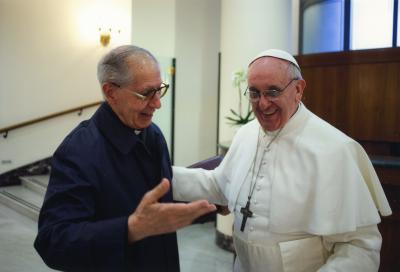A deacon reader wrote to ask me that question. He said:
A priest I know said that once a priest becomes a bishop (let alone pope), he ceases being a member of his religious order (thus for example, O’Malley and Chaput are no longer Capuchin Franciscans), especially since he no longer has a vow of obedience to his superior because they are now “above” or “beyond” that “inferior” scope of obedience. So this priest says that Pope Francis WAS a Jesuit and may still be considered an honorary member of the Society of Jesus…
Well. I passed it along to James Martin, who replies thusly:
A Jesuit is a Jesuit forever, from the day he enters the novitiate, unless he formally leaves the Society of Jesus, or, in religious parlance is “dismissed.” Most Jesuits when they have finished their Jesuit training, or “formation,” are invited to pronounce not only the three vows of poverty, chastity and obedience, as well as the special “fourth vow” to the Sovereign Pontiff “with regards to missions” (that is, an openness to be sent anywhere in the world, or on any mission), they also make another promise. That promise is not to “strive or ambition” for any high office in the Society of Jesus or the church. This promise was intended by St. Ignatius to prevent Jesuits from the kind of clerical climbing that he found so distasteful in his time. So we are supposed to avoid all such offices. But sometimes the Vatican will ask a Jesuit to become a bishop, often in places where the church has fewer local vocations, or when the Jesuit is seen by the Vatican as an outstanding candidate for the episcopacy. When that happens the Jesuit will ask the permission of the Superior General, and it is almost always granted. (I believe that this is a courtesy; technically, the Vatican can do what it likes, and ask whom it likes.) The Jesuit then is formally “dispensed” from his vows of obedience and poverty. Obedience because he obviously is not taking orders from the Superior General any longer. Poverty because under canon law a bishop must own things. (There is a promise in the final vows that the Jesuit will be open to taking advice from the General, if he offers it.) But the man is still a Jesuit. Often “Jesuit bishops,” for example, will stay in the Jesuit residence in a city they are visiting, and almost always retire in the Jesuit infirmary, and are buried in the Jesuit cemetery. The best “proof” of this is the official communique from the Jesuit Curia on the election of Pope Francis, in which Father General Adolfo Nicolas referred to him first as “Cardinal Jorge Mario, Bergoglio, S.J.” using the traditional abbreviation for a Jesuit (S.J.) and then called him “our brother.” Finally, when the Pope met Father General last week he said, “treat me like any other Jesuit.”
















